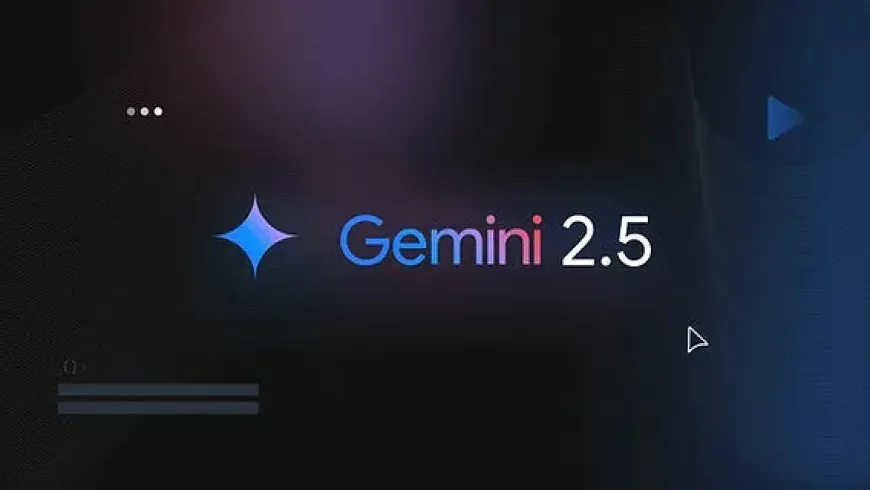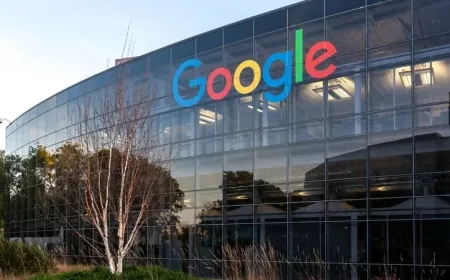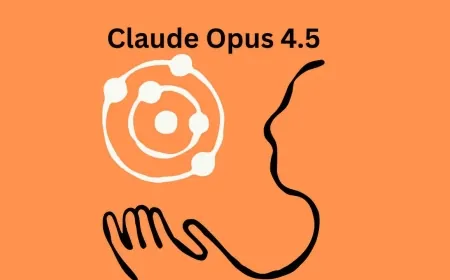Gemini 2.5 Deep Think AI Model Now Available
Google launches Gemini 2.5 Deep Think, its most advanced AI model yet, using multi-agent reasoning for math, coding, and research applications.

Mountain View, California - Google has officially launched its most sophisticated artificial intelligence model to date: Gemini 2.5 Deep Think, a multi-agent system designed to tackle complex reasoning tasks by exploring multiple problem-solving approaches in parallel. Starting today, the model is being made available to subscribers of Google’s $250-per-month Ultra plan through the Gemini app.
The release follows several months of internal testing and limited demonstrations, including a version of the model that quietly secured a gold medal at the 2025 International Mathematical Olympiad (IMO)—a feat not previously accomplished by any publicly known AI system. Google now aims to position Gemini 2.5 Deep Think as a platform for researchers, developers, and professionals seeking higher-order computational reasoning and planning capabilities far beyond current mainstream consumer AI tools.
Gemini 2.5 Built on Multi-Agent System Design
Unlike traditional single-agent models, which rely on a single processing pathway to solve a task, Gemini 2.5 Deep Think operates by spawning multiple independent agents. Each of these agents evaluates a problem from a different perspective or uses a unique strategy. Their outputs are then compared, synthesized, and filtered to select the most appropriate solution.
This architecture mirrors aspects of ensemble learning in machine learning but is more dynamic. It trades computational efficiency for higher accuracy and deeper reasoning. Google confirms that Gemini 2.5 Deep Think consumes significantly more computing resources than its predecessors, which is one reason it’s currently restricted to Ultra-tier subscribers and not available at the free or basic levels.
The company describes the model as “resource-intensive but capable of producing answers that show clear signs of methodical thinking and deliberation.”
Performance Benchmarks Show Clear Lead Over Rivals
In internal testing, Google says Gemini 2.5 Deep Think outperformed competing models from OpenAI, xAI, and Anthropic across several industry-standard benchmarks.
-
Humanity’s Last Exam (HLE): Google’s model scored 34.8%, compared to xAI’s Grok 4 at 25.4%, and OpenAI’s o3 at 20.3%. HLE measures an AI’s ability to correctly answer a wide range of crowd-sourced questions spanning math, science, and the humanities.
-
LiveCodeBench6 (Competitive Coding): Gemini 2.5 Deep Think achieved a score of 87.6%, compared to Grok 4’s 79% and OpenAI’s o3 at 72%.
These results suggest that Google’s multi-agent approach is yielding tangible performance advantages, especially on problems that require deep logic, layered dependencies, and creative constraint resolution.
Uses Range from Research to Coding
Google has already begun distributing a specialized variant of Gemini 2.5 Deep Think—the one used in the IMO competition—to a small group of mathematicians and academic researchers. Unlike commercial AI models that respond within seconds or minutes, this version is engineered to "reason for hours" if needed, offering researchers a tool that can grapple with open-ended, high-difficulty problems.
For broader users, Google says Gemini 2.5 Deep Think can assist with complex planning, creative design, and step-by-step troubleshooting. In internal use-cases, the model delivered higher-quality front-end code, more readable documentation, and better-aligned research outputs than previous Gemini models.
According to sources inside DeepMind, the model also integrates natively with tools like code execution, Google Search, and external APIs—a clear sign that Google is leaning into hybrid workflows combining AI text generation with real-time tool usage.
Training Methods Behind Gemini 2.5
Gemini 2.5 Deep Think incorporates a set of new training techniques developed in-house by Google DeepMind. According to the engineering team, these include novel reinforcement learning mechanisms that reward the model not just for correct answers, but for following multi-step reasoning processes that lead to logically valid conclusions.
This reinforcement structure pushes the AI to avoid shortcuts and hallucinations—two of the most common problems in modern language models. Instead, it emphasizes traceability of logic, so users can more easily evaluate how a conclusion was reached.
Google says the model’s behavior aligns more closely with human academic performance, in that it often works backward from a known outcome or tests multiple hypotheses before choosing a final path.
Access and Limitations
At launch, access to Gemini 2.5 Deep Think is limited. Only users of Google’s Ultra Plan—priced at $250/month—can interact with the full capabilities of the system through the Gemini app. This pricing reflects not only the infrastructure cost of running multi-agent models but also Google’s intent to position this version of Gemini as a premium tool for developers, researchers, and advanced enterprise users.
In the coming weeks, Google plans to extend access to selected developers via the Gemini API, with the goal of collecting early feedback on use cases ranging from enterprise analytics to applied mathematics.
Despite its potential, the model faces one key challenge: cost of deployment. Running multiple agents in parallel increases compute loads significantly, which means large-scale deployment to general users remains economically impractical at this stage.
Who Else Is Building Multi-Agent AI
The release of Gemini 2.5 Deep Think is part of a growing trend among leading AI labs, all of whom are investing in multi-agent architectures.
-
xAI, Elon Musk’s AI venture, recently introduced Grok 4 Heavy, a multi-agent system optimized for long-form dialogue and complex coding tasks. Like Gemini 2.5 Deep Think, Grok 4 Heavy is also gated behind a premium subscription tier.
-
OpenAI, though not yet publicly releasing its multi-agent system, confirmed via researcher Noam Brown that it used a multi-agent model to compete at the IMO, where it performed well in simulation but fell short of Google’s gold-medal-winning performance.
-
Anthropic, known for its Claude model series, has built a Research Agent designed to assist with in-depth technical writing and long-document synthesis. That model, too, uses a form of multi-agent collaboration to build more complete answers.
While these companies have taken different paths, their convergence on the multi-agent concept reflects a growing recognition that general intelligence may require parallel thinking, not just deeper models.
How the AI Field Is Adapting
The launch of Gemini 2.5 Deep Think may accelerate the timeline for specialized AI applications in fields like academic research, software engineering, data science, and finance—domains where reliable step-by-step reasoning is essential.
It also raises questions about accessibility and inequality in AI access. With pricing that places the system out of reach for many individuals and small businesses, Google’s latest release signals a potential split in the AI market between low-cost general-purpose models and high-performance tools reserved for those who can pay a premium.
For now, the focus is on stability and data. Google says it will use the next few months to study how Gemini 2.5 Deep Think performs across a variety of tasks in the hands of real users—both to improve the model and to understand where it provides unique value over single-agent systems.
Gemini 2.5 Stays Restricted to Researchers and Ultra Users
At this stage, Google has made Gemini 2.5 Deep Think available only to users subscribed to its highest-tier Ultra plan and a small group of researchers working through the Gemini API. No official rollout plan has been announced for broader access, and the model’s substantial computational demands suggest public integration may remain limited for the foreseeable future.
A separate version of the model, designed for academic use and tested at the International Math Olympiad, is being shared with select researchers. Unlike consumer-facing AI, this variant operates at a slower pace, taking hours to produce results intended for detailed analysis rather than real-time use.
While Google's engineers are reportedly working on a more compact form of the model, suitable for wider deployment, such efforts remain in development. For now, Gemini 2.5 Deep Think serves primarily as a testbed for multi-agent reasoning—an approach that distributes problem-solving across multiple AI processes running in parallel.
Its future role in consumer products, research, or software development tools will likely depend on how the model performs outside controlled testing environments—and whether its computational cost can be reduced without sacrificing performance.
Also Read: Google CEO Sundar Pichai Sets AI Model Gemini as Top Priority for 2025
































































